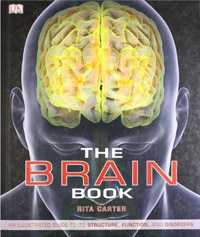
The Brain Book
This is the all-singing all-dancing book of the brain you've all been waiting for! Well, some of you have. I hope. I've certainly waited a long time to do it and the result, I think is pretty stunning.
What I've tried to do - with help from the fantastically talented artists and designers at Dorling Kindersley - is to lay out the working of the brain in a way that absolutely anyone can understand. It's a book to put on your coffee-table and flick through when you have sworn at the TV once too often for being stupid;to buy your bright niece for Christmas, and to consult whenever you think "why did I do THAT?" The book goes from fundamental anatomy through to the most up to date and brain imaging studies on subjects like the mechanics of emotion, empathy, morality and decision-making. It also has a comprehensive section on what can go wrong with the brain, and what happens to our brains - and thus our minds - as we age.
Buy UK version
Buy US version
Read reviews
I don't think that my review is even going to come close to giving this amazing, in-depth look at the human brain the accolades it deserves. All 256 pages are chock full of amazing illustrations and facts, covering literally everything that your brain does or takes part in bodily function wise. From in-depth looks at sleep and dreams, which completely captivated my attention since my son has waking and lucid dreams, and this anomaly in his sleeping patterns was explained in the text, to what happens while a person meditates, to PET scan pictures of actual brains in many different situations. It is so incredibly in-depth that you have to buy it to experience it.
Children's Book Review: The Human Brain Book
The rapidly expanding field of neuroimaging brings new meaning to the adage "A picture says a thousand words." Newly released, The Human Brain Book combines incredible brain images with fascinating neuroscientific findings. Newsweek Are women more emotionally aware than men? Why does your arm hurt during a heart attack? Could people who see fairies be telling the truth? These are just some of the questions answered in a fascinating new book ..... [that] reveals what's REALLY going on inside our brains (and why we need to keep them fed with Jaffa Cakes) Written by Rita Carter, a leading science and medical writer, it provides extraordinary insights into the way our brains work - and why we behave and act in the ways we do.
Daily Mail
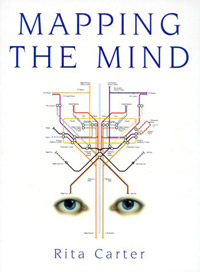
Mapping the Mind
I have always been fascinated by what makes people tick. Why do some people love dressing up while others are happy wearing a sack? Why do certain individuals flock to parties while others do anything to avoid them? How come certain otherwise sensible folk believe that aliens have landed? Why do some people find farting funny? And why are some of us natural artists while others would be hard-pushed to paint their toenails?
Psychologists have done their best to explain these things but until recently they could only guess what was happening in the brain by observing behaviour - there was no way to look inside people's heads and observe the brain activity underlying their conduct. Now, though, scientists can do just that. Imaging technology like PET and functional MRI make it possible to watch the human mind at work, and the picture that is being built up as a result is astonishing.
I first came across these brain imaging studies in the late 1980s and I was instantly hooked. The first studies were crude but as the technology got better I saw that the images were adding up, like bits in a jigsaw puzzle, to reveal something quite startling: a complete picture of the human mind at work. The biological roots of human behaviour, and the neurological differences which create individual personalities, were suddenly becoming visible. For several years I scoured the bookshops looking for a book which pulled this picture together, but all I could find were dense, jargon-laden tomes or superficial psychobabble. So I decided to write the book myself. I soon found that it was not enough simply to piece together brain imaging findings. To make sense of them it was necessary to weave them into our existing models of the mind - those we have constructed through evolutionary biology, psychology and studies of eccentric or aberrant behaviour. Then it seemed essential to relate what happens in "the" brain to what happens in "my" brain - and yours... to put the neuroscience into the context of everyday experience and behaviour. Mapping the Mind is the result.
Buy UK version
Buy US version
Read reviews
... one of the clearest and best-illustrated attempts to explain the virtually inaccessible - the human brain.
John Cornwell, Sunday Times
Within the hardware of the brain there lurks a software called the mind. Rita Carter has brilliantly conveyed the thrill of discovering what this software can do.
Matt Ridley
... riveting and up-to-the-minute.
Maggie Gee, Daily Telegraph
...a handsomely produced and accessible introduction to our startling new ability to observe and map the brain... no previous knowledge is assumed, but by the end the reader will be well informed of the latest developments.
Anthony Daniels, Sunday Telegraph
It is a tour de force - a compendium of anecdote, research, and speculation that is quite breathtaking... excellent, informative and provocative.
Prof Haydn Ellis, Vice-Chancellor Cardiff University
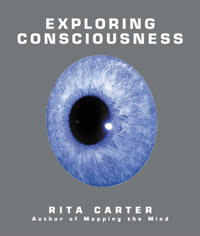
Exploring Consciousness
Consciousness - what it is and how it comes to exist in an otherwise obviously material world - is famously known as the "hard" problem. It is so hard, actually, that when I started to research and write about the brain for my first book I steered well clear of it, just as most sensible scientists had managed to do for a century or more.
Mapping the Mind therefore dealt almost entirely with the (relatively) "easy" problems - the biological processes that underpin consciousness. Once you start thinking about these things, though, the hard problem creeps up on you. Why should the oh-so-physical fizz of electrically charged brain cells produce this other, seemingly non-physical thing - our subjective experience? Consciousness (Exploring Consciousness is the title of the US edition illustrated here) is my attempt to tackle that age-old question, and to bring contemporary neuroscience to bear on the problem along with timeless philosophical approaches.
I can't claim to have cracked it. In fact, it nearly cracked me - there were times while I was researching this book when I actually wept with the frustration of grappling with some of the slippery, counter-intuitive, concepts that haunt this subject. So this book doesn't promise to let you in to the secret of consciousness - only to show you just how tricky (and endlessly fascinating) it is, and how clever are some of the attempts that have been made by philosophers and scientists to get to grips with it. At the moment I think that is the best anyone can offer - I console myself that no-one else has explained it yet either!
Buy
See me talk about the book
Read reviews
Rita Carter conveys a real sense of excitement and fascination with her subject...which is likely to capture the imagination of a non-specialist audience...the sheer scope of Carter's project is stunning and she handles her material with flair and confidence - a feast for the mind.
Professor Rosaleen McCarthy, Nature
Rita Carter successfully conveys the richness and dynamism of consciousness studies today.. She presents all sides in a style that is lively, engaging and often entertaining. One of the many strengths of the book is how clearly she explains the many, often surprising implications of neuropsychology for our ordinary notions of perception, free will and morality.
Jonathan Shear, New Scientist
In this accessible and illuminating book Rita Carter surveys what is currently known and thought about this intriguingly difficult and profoundly important subject...she succeeds triumphantly, having a knack for clear exposition and apt arrangement.
A.C. Grayling, Daily Mail
a highly readable examination of science's most elusive concept
Psychology Today
a superbly presented academic enquiry which deftly blends science and philosophy.
Midwest Book Review
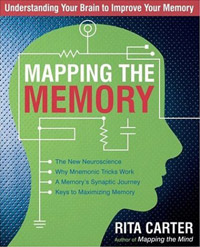
Mapping the Memory
Mapping the Memory is the US title of a book which first appeared in the U.K. in the 'Use Your Brain' series. The series deals with common psychological problems - depression, anxiety, addiction and memory disorders. There are many books on these subjects, of course, but these differ in that they set out to explain the biological basis of the conditions - what the brain itself is doing (or not doing) to produce them; they also go into some detail about available physical therapies.
In addition to this, where appropriate, they provide do-it-yourself Cognitive Behavioural Therapy (CBT) This is the only form of "talking" therapy which has been proved to work (psychoanalysis is a wonderful hobby for the rich but there is precious little evidence to suggest that it has ever actually helped anyone). Your chances of being sent to a CBT therapist by your doctor are very slim, however, as there are far too few of them. So these books are intended to be practical as well as informative.
This series of books was first published in 2004 but Use Your Brain to Beat Memory Loss (the only one of the series that I wrote myself) has since been re-issued under the title Beat Memory Loss. Amazon, bless ‘em, are trying to flog you both editions in a single package. Much as I'd appreciate the double royalties I suggest you resist the offer. The US edition is still available under the title Mapping the Memory.
Buy
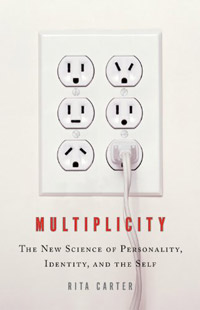
Multiplicity
How multiple are you?
Have you ever woken in the small hours groaning with embarrassment at the memory of something you did the night before? Or watched someone you thought you knew well turn into a stranger before your eyes?
We each tend to think that we are just one person - a single, continuous, and consistent self. But the truth is that we are each a group of personalities and we slip and slide from one to the other as we encounter different situations.
Once each personality recognises the others, they can start to recognise each others' strengths and weaknesses and between them decide which one should be in control at any time.
Multiplicity explains how personalities are made and kept separate in the human brain, how to discover it in yourself and how to recognise, identify and take control of your various personalities.
Published by Little Brown (March 2008 in UK, April 2008 in US).
Buy UK version
Buy US version
Listen to Rita talk about Multiplicity on Radio 4 Woman's Hour
Read reviews
In this interpretation of the many selves within the human mind science and medical writer Rita Carter offers a unique definition of multiple personalities in a functioning person, without the usual discussion of phobias or other psychological disorders.... She adds intriguing diagrams of memory and recall patterns illustrating how people behave differently in different situations, and exercises which encourage the reader's personalities to interact and communicate positively with each other. Carter is pushing the envelope on personality, and her book should spark debate on the flexibility of the human mind.
Publishers weekly
Carter has a knack for making complex concepts accessible. If you've ever thought "I can't believe I just did that!" this book will fascinate and entertain
Source magazine
Well researched, brilliantly written and totally fascinating - and it has already impacted on my own life
Mary Zacaroli Oxford Times
A riveting account of the latest science of the mind..what emerges is a stunning new perspective on what makes us tick - that, rather than being static beings, our various personalities 'form, change, fade away, reform, merge, shrink and grow'
David Shuckman Daily Mail
Take the multiplicity test
People vary widely in the number of personalities they have and also in the degree to which their personalities are separated. At one end of the spectrum there are a few who are genuinely "one and the same" in all situatiosns, while at the other there are those whose personalities are so separated from one another that they do not even share the same memories. The vast majority of people are somewhere in the middle.
Answer the folowing questions (ideally with the help of one or more people who know you well) and Score "0" for each "never" 1 for "sometimes " and 2 for "absolutely, all the time.".
1) Do you find your mental skills, including memory for facts, vary from time to time for no obvious reason (eg not connected with tiredness or drinking). For example, are you aware that sometimes you can romp through a crossword puzzle while at other times, given a similar puzzle, you cannot get a single clue?
2) Does your handwriting change noticeably at different times?
3) Do you ever refer to yourself as "we"?
4) Do your personal memories sometimes feel like a film you have seen, rather than something that actually happened to you?
5) Are you called by a number of different names or nicknames and/or do you think of yourself by different names?
6) Are you ever gripped with enthusiasm for a while by a hobby or pastime (DIY, gymnastics, gardening) that you find utterly boring at other times?
7) Do you ever find yourself uttering the phrase "what on earth made me do that?" (or words to that effect)?
8) Do you talk to yourself?
9) Do you have "binges" - of food, cigarettes, or alcohol?
10) Is your behaviour chamelion-like, eg do you find yourself adopting the accent or intonation of the person you are talking to, or putting on a "telephone voice"?
11) Do you swing suddenly from one mood to another for no apparent reason?
12) Do certain circumstances trigger skills or knowledge that is not usually available to you. Eg. In a foreign country do you find yourself speaking the language better than you thought possible?
13) Do your tastes - in food, music, films, literature - differ widely from time to time?
14) When you look in your wardrobe do you see clothes that you cannot imagine wearing and wonder why you bought them?
15) Do vague acquaintances treat you as though they know you far better than you would expect?
16) Do friends and acquaintances refer to events they claim to have shared with you which you cannot recall?
17) Do people you would regard as trustworthy claim you have told them things which you cannot believe you would have said?
18) If you come across something you wrote a while ago - an unposted letter from you to a friend, perhaps, or an old diary or notebook, do you sometimes fail to realise at first that the author is you?
19) Do you find yourself laughing or crying, to your own surprise, for no reason you can think of?
20) Does your level of self-esteem/self-love go up and down regardless of others' expressed opinion of you?
Now add up your total score.
Scoring: Basically, the lower your score the nearer you are towards the singlet end of the spectrum. Most people score between 10- 30. A very low score (less than about 8) can mean one of two things: either you are exceptionally unified, or it means that the personality who completed this questionnaire is unable to see the Others and is answering just for itself. To distinguish between these two, come back to these questions at another time - ideally when you are in a different place, doing a different thing, with different people and at a different time of day. If your score is similar and your answers to each question are more or less the same it is likely that you really are fairly unitary. If the score is different, it suggests that you have at least one more personality than you might at first think.
To find out how your personalities were formed, who they are and how to make sure they work together instead of against one another, buy Multiplicity - the new science of personality, by Rita Carter